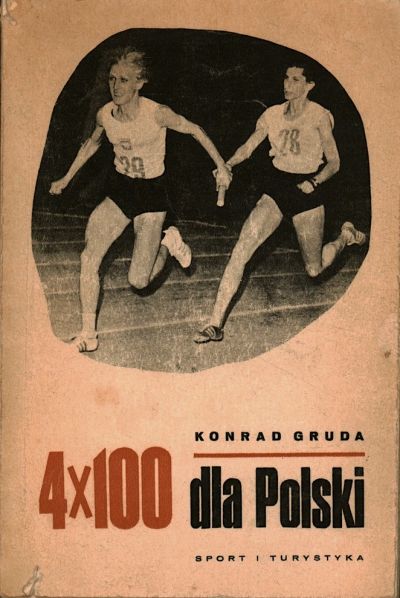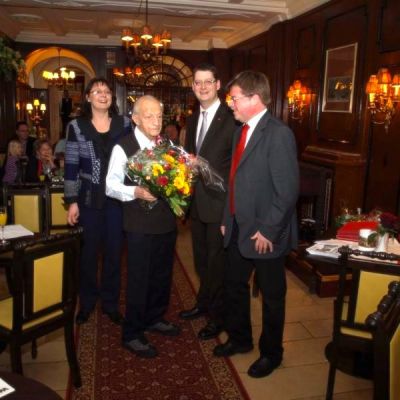Flexible in all systems. The many lives of Konrad Gruda

A radio and television sports journalist
In September 1949, Gruda joined the state travel company ORBIS, where he remained until 1954. After working briefly for the International Repatriation Committee for Korea, which organised the exchange of prisoners between North and South Korea – he later also became a member of a commission tasked with monitoring the ceasefire in Laos – from April 1954 onwards, he was sent to the sports department at Polskie Radio as the “strong man” successor to Aleksander Rekszta. He remained in a management post there until 1957[34]. One of his inventions was the daily show “Kronika Sportowa”, which was first aired on 30 November 1954 and which is still being broadcast today.
Thanks to his good connections, he was able to improve the funding available for reporting and made it more professional. Ultimately, however, this proved his downfall. When he demanded that employees who in his view were unsuited to their post, he was brought down by the editorial collective and the trade unions, with the agreement of the Communist Party.
During the 1960s, he was an editor and popular presenter for Polish television, where he worked on programmes such as “Medale i detale”, “Na zdrowie” and “Start i meta”. His colleagues were aware of his political past, which meant he was sometimes feared by those who at the same time also acknowledged his outstanding qualifications in the field of sport[35].
In 1949, he became president of the Polish Swimming Federation, and following its disbandment in 1951, chairman of the swimming section on the Main Committee for Physical Culture. He remained in this post until the Polish Swimming Federation was revived in 1957. In this capacity, he also attended the Olympic Games in Helsinki in 1952, and also travelled as a journalist to the Olympic Games in Melbourne in 1956 and Rome in 1960. In 1957 and 1960, he was chairman of the Investment Committee of the Polish Swimming Federation; from 1960 to 1962, he was vice-president for sports and from 1962 to 1965, he was chairman of the Committee for Water Sports. On occasion, he was allowed to travel to France and Britain so that his wife could receive medical treatment.
However, from 1963 to 1967, he was refused permission to travel abroad on direct orders from the Interior Minister, Władysław Wicha[36]. Gruda was clearly shocked and taken by complete surprise by this measure, and attempted to defend his position by writing letters of justification, as well as making efforts to identify the persons responsible[37]. Both strategies proved ineffective.
Gruda was already under suspicion of working as a spy for a western country even during the late 1950s. The security organs began an “operative observation” of Gruda, in other words, a measure in which “so-called target persons [were] kept under observation over a specified period of time in order to gain information about the places they visited, their connections, employment, life habits and, possibly, illegal activities”[38]. Operation Sprawodawca (“reporter”) was conducted from 1961 to 1964[39]. Under the direction of Captain Ryszard Bartosik, Gruda’s environment was thoroughly investigated with the help of informants recruited for the purpose. In one case, an attempt was even made to plant a female informant in the home of Gruda’s invalid mother[40]. The scale of the operation is reflected in the fact that 117 names are listed from his personal and professional environment in the record of the people involved.
Despite this thorough surveillance, which focused on Gruda’s foreign contacts, his interest in an allegedly newly invented combustion engine and the purchase of a western car, no evidence could be found of any kind of spying activity. Gruda’s connections were limited mainly to exiled Poles who had little influence.
During the 1950s and 1960s, he wrote or edited several books. One which attracted a particularly high level of interest was the story of a flagship in Polish sport, the women’s 4x100 metre athletics team, who won gold at the 1964 Tokyo Olympics. Gruda was friends with the star of the team, three-time Olympic champion Irena Kirszenstein-Szewińska. He also wrote occasional magazine articles, including for “Przekrój” and “Turystyka”, a monthly periodical for which he was editor-in-chief from 1950–1952[41].
From the late 1950s onwards, Gruda was in casual contact with Hansjakob Stehle from the “Frankfurter Allgemeine Zeitung” newspaper (“FAZ”). “The editor spoke very good Polish, but he didn’t know much about sport,” Gruda later wrote. In 1959 and 1960, he wrote several articles for the FAZ about Polish sports under the pseudonym “Karol Wisniewski”[42]. This connection also came to the attention of the state security organs, although piecing together the story of this small-scale collaboration stretched their research capacity to its limits.
[34] Bogdan Tuszyński: Sport na antenie Polskiego Radia w okresie powojennym (1945–1981), in: Kwartalnik Historii Prasy Polskiej 32 (1993), no. 2, p. 105–120, here p. 108.
[35] Cezary Chlebowski: Bez pokory. Vol. 2, Warszawa 1997, p. 473.
[36] IPN BU 00/0/208/2036, vol. 1, p. 197, dated 23/4/1963.
[37] IPN BU 00/0/208/2036, vol. 2, p. 17–18, dated 14/3/1963: Letter to the Committee for Party Control at the Central Committee of the PZPR; IPN BU 0/208/2036, vol. 1, p. 210–213, dated 20/10/1963: Letter to the office of the Minister for Internal Affairs, addressed to Colonel Marian Janic. In these letters, Gruda blamed his dismissal from the citizens’ militia on personal conflicts. He was clearly unaware of the scale of the investigations against him.
[38] https://www.stasi-unterlagen-archiv.de/mfs-lexikon/detail/beobachtung-operative/ (last accessed on 14/2/2025).
[39] IPN BU 00/0/208/2036, vol. 1 and 2.
[40] IPN BU 00/0/208/2036, vol. 1, p. 269: official note dated 14/12/1962.
[41] See e.g.: Dzień poślubny z Mikrusem, in: Przekrój (1959), no. 3, p. 9–10, https://przekroj.pl/archiwum/artykuly/34735?f=autor:2519 (last accessed on 16/2/2025).
[42] See e.g. “Der Kölner Leichtathletik-Länderkampf in polnischer Sicht”, in: FAZ, 17/9/1959.




![Konrad Gruda: Zwölf Uhr einundvierzig. Wird Jan der tödlichen Gefahr entrinnen?, München 1979 [1975] Konrad Gruda: Zwölf Uhr einundvierzig. Wird Jan der tödlichen Gefahr entrinnen?, München 1979 [1975] - Book cover](/sites/default/files/styles/width_100_tiles/public/assets/images/Konrad%20Gruda_Zwo%CC%88lf%20Uhr%20einundvierzig.%20Wird-Jan-der-to%CC%88dlichen-Gefahr-entrinnen.jpg?itok=z9Cru2Qk)




